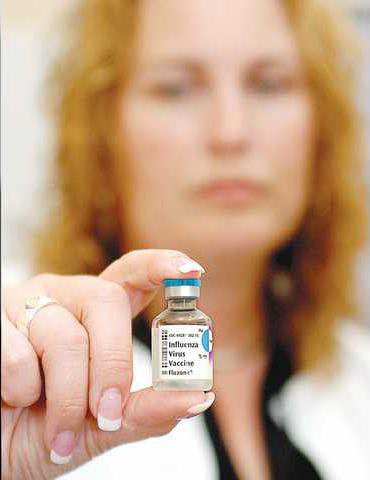There’s no excuse for not getting a flu shot this year. Certainly you can’t claim there isn’t enough vaccine to go around. The Centers for Disease Control and Prevention predicts as many as 146 million doses will be manufactured this flu season. And with six pharmaceutical companies producing vaccine, supplies should be adequate even if one or two manufacturers fall short. This week, local health care providers have been unpacking boxes of vaccine, and most clinics will begin offering shots to their patients by early October. Dave Palmer, spokesman for District 2 Public Health, said about 23,000 doses of flu vaccine have been ordered by health departments in the 13-county district. The Hall County Health Department will get about 2,750 doses. "Most health departments now order from more than one manufacturer, because of the supply problems we had several years ago," said Palmer. In 2004, there were only two companies worldwide producing flu vaccine. When vaccine from a plant in England was found to be contaminated, the expected supply for the U.S. was cut in half. Vaccine had to be rationed that year, and only people who were at high risk for complications from flu were allowed to get the shot. Last year, there was an entirely different problem. Vaccine was plentiful, but it didn’t work very well. Nine months before each flu season, scientists have to decide which three strains of flu will be most dominant in the human population. In 2007 they guessed wrong, so the strains in the vaccine didn’t match the type of flu most people were getting. This year, the Food and Drug Administration has completely updated the shots, replacing all three strains. Whether the experts have guessed correctly this time won’t be known until the flu season is under way. It usually begins in October and runs through spring, with a peak around January or February. Another change this season is that the CDC has expanded its recommendations for who should get the vaccine. In the past, flu shots were advised for preschool children, the elderly, and anyone who had a chronic health condition or weakened immune system. Now, the CDC says virtually all children ages 5 to 18 years old should get a flu shot, even if they’re healthy. It’s not so much to prevent the kids from getting sick as it is to protect those around them. "We need to vaccinate children because they spread the flu easily," Palmer said. Indeed, every winter Northeast Georgia Medical Center bans young children from visiting the hospital to protect patients from catching the virus. Palmer said local health departments will have several types of flu vaccine available, formulated for babies, children and adults. Starting Oct. 14, flu shots will be available on a walk-in basis at the Hall County Health Department for $25. The department also is offering a special flu shot clinic on Oct. 13. The agency is actually closed on that date in observance of Columbus Day, but the building at 1290 Athens St. will be open from 9 a.m. to 2 p.m. just for flu shots. "Because everything else is closed, there will be more parking, and people can get in and out quicker," Palmer said. Health department nurses will also be giving flu shots at several off-site locations, including at the HealthSmart Expo on Oct. 8, the East Hall Community Center on Oct. 20, the South Hall Community Center on Oct. 21, and the Hall County Senior Center on Oct. 24. "We encourage people to go to off-site centers to get their shots," said Palmer. "We’re trying to make it as convenient as possible." Many chain pharmacies also will be offering flu shot clinics for adult patients in October. But last week, the fate of those pharmacy-based events seemed to be in doubt. On Sept. 11, the Composite State Board of Medical Examiners issued a statement saying that only doctors can give permission for patients to have flu shots. "Under both federal and Georgia law, influenza vaccine is considered to be a dangerous drug," the statement said. "Georgia law requires a valid patient-specific prescription." The board asserts that Georgia law has never allowed "blanket protocols," in which a doctor could tell a pharmacist that it’s OK to vaccinate anyone who walks in the door. However, board members agreed that some sort of compromise is needed. "The board recognizes that widespread availability of the vaccine is a valid public health concern and that blanket physician protocols authorizing pharmacists to dispense flu vaccinations may improve access," the statement said. Gov. Sonny Perdue quickly responded to the board with a statement of his own, also on Sept. 11. "For public health reasons, we believe it is imperative that pharmacists and others act as they have in the past," Perdue said. "No one has been prosecuted for delivering flu shots in the standard manner of past years. This administration will not call for sanctions against those acting in the best interest of Georgians and in a manner consistent with past practices." That same day, the Medical Association of Georgia issued a statement of its own, urging people to get their flu shots from a primary care physician. The medical association’s spokesman Tom Kornegay said the timing of the release was coincidental and not a response to statements made by the other parties. "Our core message is that people need to be vaccinated," he said. David Cook, executive director of the state medical association, said he agrees with the board’s position. "The reality is that the pharmacies have been breaking the law," he said. "They can administer any drug, but they can’t order it. The law in Georgia has always been that a flu shot must be given under a physician’s protocol." Cook said the law is intended to protect patients. "There can be allergic reactions. That’s why the federal government lists flu shots as a dangerous drug," he said. Cook said there’s not a problem with nurse practitioners administering flu shots, because the nurses always work under a doctor’s supervision. But pharmacists don’t. That could change in the future, though. "We’re working with the (Georgia) pharmacy association on having doctor protocols over pharmacists," Cook said. "We’ve met with them and made some proposals. I expect there may have to be some legislation introduced to tweak the law." But for the current flu season, most pharmacies are expected to proceed as they have in past years, based on the reassurance they’ve received from the governor. "It is my expectation that health care professionals will act in the best interests of public health," Perdue said.
Healthy Monday: Hall takes steps to ensure residents can get dose of flu vaccine

